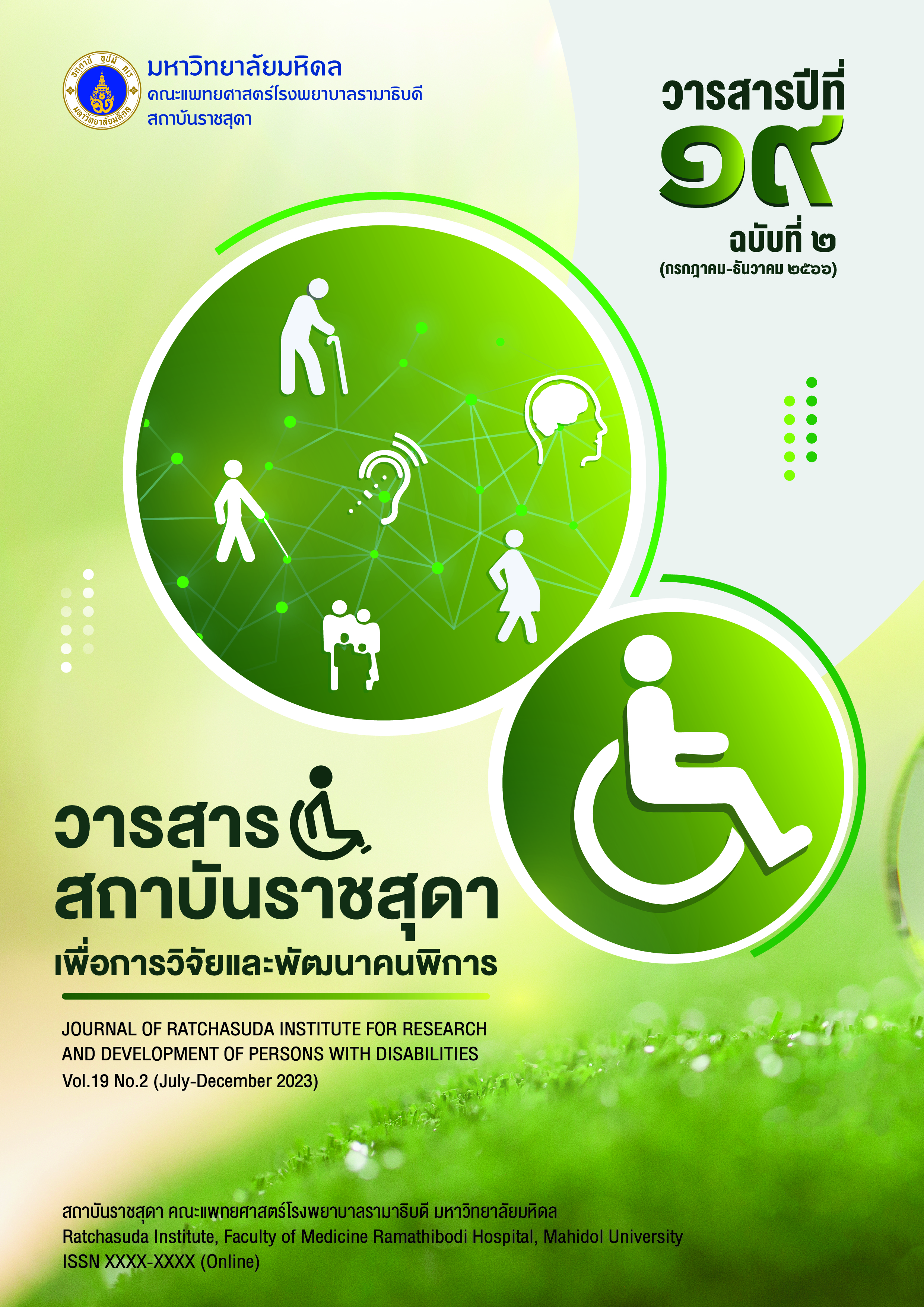The Opinion on Capability Development of Persons with Disabilities to Become Social Entrepreneurs
Keywords:
Social Entrepreneur, Social Enterprise, Capability Development of Persons with DisabilitiesAbstract
The objectives of this qualitative research are to examine the opinions on capability development of persons with disabilities in becoming social entrepreneurs, the associated problems, obstacles, and recommendations for such persons to operate social enterprise, and the further extension of the short training course: “Mini MBA for Social Enterprise for Persons-with-Disabilities Organizations and Network” offered during 2018-2022. Data were gathered by selecting specific (purposive sampling) figure 10 persons namely persons supporting person with disabilities (PWDs) from private sector, PWDs organizations and PWDs entrepreneurs, public and relevant organizations responsible for capacity development of PWDs. The data were analyzed by using content analysis, the results indicate that persons with disabilities are capable of running social enterprises because they have a positive mindset, inspiration, and personal characteristics conducive to being social entrepreneurs. Especially if they are supported on capabilities building required such as knowledge and understanding of social enterprise, appropriate training on skills and experience of actual business environment. The public sector should continuously provide a well-integrated eco-system with cooperation from networks of affiliated organizations from all parties in order to enhance and extend opportunities for the progressive growth of persons-with-disabilities social enterprises. Effective supports should also come from persons-with-disabilities families, persons-with disabilities-organizations, private sector, academic institutions, and networks of social enterprises. The problems, and obstacles for development of persons with disabilities to be effective social entrepreneurs include negative mindset, Thai social beliefs, lack of knowledge and understanding, insufficient collective effort of persons-with-disabilities organizations, access to market opportunity, inconsistent production standards and high production costs. On the extensions of the short training course, which is the initial point of changing the mindset, several suggestions are proposed such as learning-exchange forum, specialized-group training, extension to designated communities and cooperative arrangement of relevant activities with pertinent parties.
Downloads
References
Chaiwat, T., Thinkan, P., & Wongkaew, K. (2016). ‘Inclusive Growth’ a possible way to reduce inequality. Thailand Development Research Institute. https://tdri.or.th/2016/01/inclusive-growth-new-development-model/.
Empowerment of persons with disabilities act, B.E. 2550 (2007) and amendment (No. 2), B.E. 2556. (2013). (2013). Government Gazette. No. 130 Section 30A. page 6-12.
Kasim, R., & Hudson, J. (2006). FM as a social enterprise. Facilities, 24(7/8), 292-299. https://doi.org/10.1108/02632770610666143.
Kumar, B. (2022). Social entrepreneurship 101: Business models and examples to inspire you. Shopify. https://www.shopify.com/blog/social-entrepreneurship
Murillo-Luna, J. L., García-Uceda, E., & Asín-Lafuente, J. (2021). Obstacles to Social Entrepreneurship. In D. M. Wasieleski & J. Weber (Eds.), Social Entrepreneurship (Vol. 5, pp. 195-216). Emerald Publishing Lim.
Nopkesorn, T. (2005). Qualitative methods: A field guide for applied research in human/organization/community and social development. Chokcharoen Marketing.
Nuchpiam, P., Prateeppornnarong, D., & Jenjarrussakul, B. (2018). Social enterprise in Thailand: Some Observations on the social enterprise promotion bill. Journal of Thai Ombudsman, 23(1), 109-141.
Office of Social Enterprise Promotion. (2022). Social enterprise assembly 2022 resolutions. Office of Social Enterprise Promotion, Office of the Prime Minister Bangkok, Thailand.
Office of the National Economic and Social Development Council. (2021). Thailand’s SDG report 2016-2020. Office of the National Economic and Social Development Council, Office of the Prime Minister Bangkok, Thailand. sdgs.nesdc.go.th/progress report-sdgs-of/
Peek, S. (2020). What is social entrepreneurship? 5 examples of businesses with a purpose. U.S. Chamber. https://www.uschamber.com/co/start/startup/what-is-socialentrepreneurship.
Ronaparp, P. (2021). Reducing inequality-leading to sustainable growth for Thailand. Puey Ungphakoen Institute for Economic Research. https://www.pier.or.th/abridged/2021/06/.
Social Enterprise Promotion Act B.E. 2562. (2019). Government Gazette. No. 136 Section 67 A. page 32-56.
Downloads
Published
How to Cite
Issue
Section
License
Copyright (c) 2023 Journal Of Ratchasuda Institute for Research and Development of Persons With Disabilities

This work is licensed under a Creative Commons Attribution-NonCommercial-NoDerivatives 4.0 International License.
บทความที่ได้รับการตีพิมพ์เป็นลิขสิทธิ์ของวารสารสถาบันราชสุดาเพื่อการวิจัยและพัฒนาคนพิการ






